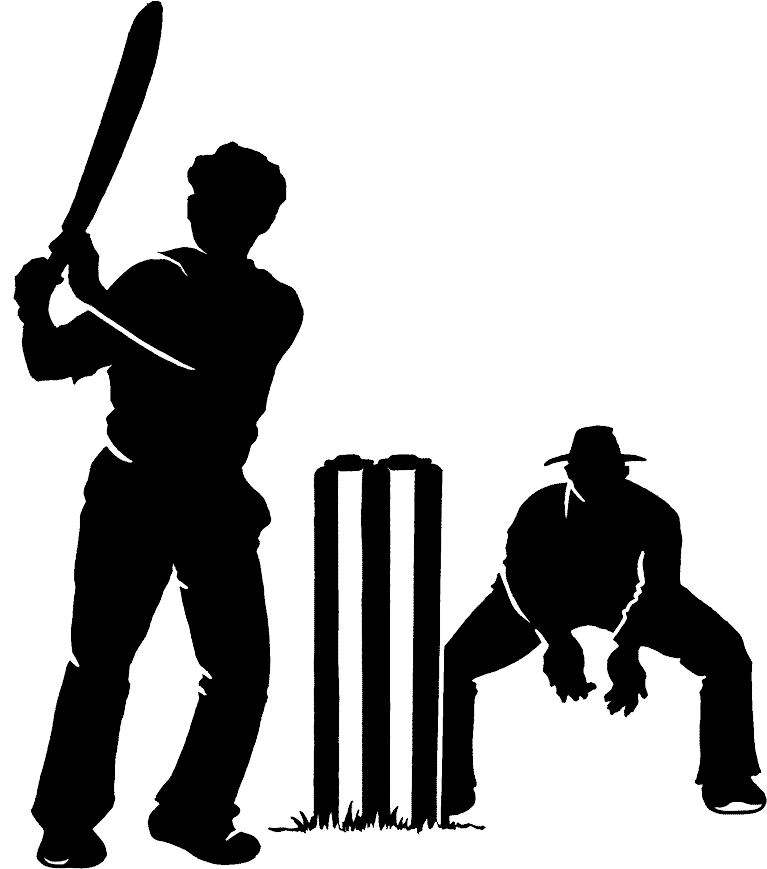
This image has format transparent PNG with resolution 767x869.
You can download this image in best resolution from this page and use it for design and web design.
Cricket PNG with transparent background you can download for free, just click on download button.
Cricket is a bat-and-ball game played between two teams of eleven players on a field at the centre of which is a 20-metre (22-yard) pitch with a wicket at each end, each comprising two bails balanced on three stumps. The batting side scores runs by striking the ball bowled at the wicket with the bat, while the bowling and fielding side tries to prevent this and dismiss each player (so they are "out"). Means of dismissal include being bowled, when the ball hits the stumps and dislodges the bails, and by the fielding side catching the ball after it is hit by the bat, but before it hits the ground. When ten players have been dismissed, the innings ends and the teams swap roles. The game is adjudicated by two umpires, aided by a third umpire and match referee in international matches. They communicate with two off-field scorers who record the match's statistical information.
There are various formats ranging from Twenty20, played over a few hours with each team batting for a single innings of 20 overs, to Test matches, played over five days with unlimited overs and the teams each batting for two innings of unlimited length. Traditionally cricketers play in all-white kit, but in limited overs cricket they wear club or team colours. In addition to the basic kit, some players wear protective gear to prevent injury caused by the ball, which is a hard, solid spheroid made of compressed leather with a slightly raised sewn seam enclosing a cork core which is layered with tightly wound string.
Historically, cricket's origins are uncertain and the earliest definite reference is in south-east England in the middle of the 16th century. It spread globally with the expansion of the British Empire, leading to the first international matches in the second half of the 19th century. The game's governing body is the International Cricket Council (ICC), which has over 100 members, twelve of which are full members who play Test matches. The game's rules are held in a code called the Laws of Cricket which is owned and maintained by Marylebone Cricket Club (MCC) in London. The sport is followed primarily in the Indian subcontinent, Australasia, the United Kingdom, Ireland, southern Africa and the West Indies, its globalisation occurring during the expansion of the British Empire and remaining popular into the 21st century.[1] Women's cricket, which is organised and played separately, has also achieved international standard. The most successful side playing international cricket is Australia, having won seven One Day International trophies, including five World Cups, more than any other country and having been the top-rated Test side more than any other country.
In cricket, the rules of the game are specified in a code called The Laws of Cricket (hereinafter called "the Laws") which has a global remit. There are 42 Laws (always written with a capital "L"). The earliest known version of the code was drafted in 1744 and, since 1788, it has been owned and maintained by its custodian, the Marylebone Cricket Club (MCC) in London.
Cricket is a bat-and-ball game played on a cricket field (see image, right) between two teams of eleven players each. The field is usually circular or oval in shape and the edge of the playing area is marked by a boundary, which may be a fence, part of the stands, a rope, a painted line or a combination of these; the boundary must if possible be marked along its entire length.
In the approximate centre of the field is a rectangular pitch (see image, below) on which a wooden target called a wicket is sited at each end; the wickets are placed 22 yards (20 m) apart. The pitch is a flat surface 3 metres (9.8 ft) wide, with very short grass that tends to be worn away as the game progresses (cricket can also be played on artificial surfaces, notably matting). Each wicket is made of three wooden stumps topped by two bails.
The essence of the sport is that a bowler delivers (i.e., bowls) the ball from his end of the pitch towards the batsman who, armed with a bat is "on strike" at the other end (see next sub-section: Basic gameplay).
The bat is made of wood, usually salix alba (white willow), and has the shape of a blade topped by a cylindrical handle. The blade must not be more than four and one quarter inches (108 mm) wide and the total length of the bat not more than 38 inches (965 mm). There is no standard for the weight which is usually between 2 lb 7 oz and 3 lb (1.1 and 1.4 kg).
The ball is a hard leather-seamed spheroid, with a circumference of 22.9 centimetres (9.0 in). The ball has a "seam": six rows of stitches attaching the leather shell of the ball to the string and cork interior. The seam on a new ball is prominent, and helps the bowler propel it in a less predictable manner. During matches, the quality of the ball deteriorates to a point where it is no longer usable, and during the course of this deterioration its behaviour in flight will change and can influence the outcome of the match. Players will therefore attempt to modify the ball's behaviour by modifying its physical properties. Polishing the ball and wetting it with sweat or saliva is legal, even when the polishing is deliberately done on one side only to increase the ball's swing through the air, but the acts of rubbing other substances into the ball, scratching the surface or picking at the seam is illegal ball tampering.
In this page you can download free PNG images: Cricket PNG images free download